- Home
- Steven Becker
Wood's Revenge Page 3
Wood's Revenge Read online
Page 3
Trufante pulled the anchor onto the roller and placed the safety lanyard on the chain, then ran back to the helm. The one-hundred-fifty horsepower engine started and he slammed the throttle down. Spinning the wheel, the boat plowed a semicircle and started a course back to shore. Mac turned the controls over to Trufante, slid the gear to the side and started pushing the net into the built-in fish box. He had the bulk of it in, with just a few buoys sticking out, when he felt the engine slow. When he looked up, flashing lights greeted him.
4
Mac took over the helm and dropped the engine back to an idle, just enough power to maintain position. It was impossible to mistake the boat moving toward them. With the flashing lights on the tower and Sheriff displayed in large bold lettering on the white hull, he knew Trufante had led him into trouble again. When the boats were close to touching, the deputy dropped two fenders over the side and tossed a line to Trufante.
“What are you two doing out this way?” the deputy asked.
Mac breathed deeply, trying to remain calm. His relationship with the uniformed man was tenuous at best—at least from his perspective. He hadn’t been arrested for anything, but he always seemed to be skirting trouble. Standing at the wheel, he felt helpless as the deputy scanned the deck of his boat. “Just out checking some new numbers,” he said.
“What’s with the buoys?” the deputy asked.
Mac knew he was skeptical and needed to explain. He took off his ball cap and rubbed the stubble on his head. “It’s still all churned up on the ocean side. Thought we’d check out some lobster holes for next season. Ran across a string of abandoned traps. Busted them up and pulled this off,” he said, wanting to keep the lie to a minimum.
“Sure you ain’t up to anything I should know about?” he asked, clearly looking at Trufante.
The Cajun had his head down. “No, just took him along to run the boat while I was under,” Mac answered. “It’s a long way out for you, too.”
“Looking for a missing boat,” the deputy said.
“Not much of a search with just you,” Mac said. Search and rescue operations tended to be larger than life, giving the competing agencies a chance to showcase their new toys.
“Just a report from one of the marinas up in Key Largo that a boat was missing. No missing persons reports, so, not worth the big search if it’s just a wreck.”
“What kind of boat was it?” Mac asked, already guessing at the answer.
“They said it was a twenty-four-foot center-console.”
Mac nodded and put his cap back on. The deputy was right about the search. Without a missing persons report, the only ones interested in finding the boat would be the insurance company, placing this squarely in his wheelhouse. “Nothing floating around that we’ve seen,” Mac said, careful with his choice of words.
“All right. If you see anything, let me know,” the deputy said, catching the line as Trufante wasted no time tossing it to him. Seconds later, he spun the wheel and was gone.
“Got lucky there,” Trufante said. “If you weren’t here, he’d be hauling my ass to jail.”
“You’re probably right,” Mac said, pushing the throttle forward. He waited until the boat was a good half mile away before accelerating. He wanted to be rid of the Cajun and whatever trouble he was in. If there was one boat out searching, there could be more, and if they ran into a Fish and Game officer, things might not be so easy trying to explain what they were doing with a gill net aboard. There were no fish, but he’d already had another boat confiscated when Trufante had gotten suckered into a lobster poaching scam. The similarities were too hard to ignore.
There was no feeling of elation or smile on his face this time when the boat got up on plane. He adjusted the rpms for a smooth ride, and a half hour later he was grateful when Wood’s Island came into sight. Slowing, he turned into the channel and coasted to a stop at the piling. “If I were you, I’d get the net and be gone before Mel comes down,” Mac said, letting Trufante out of his deal to take the trash. Better just to be rid of him. He helped Trufante load the net into the skiff and pushed him off, watching as he sped toward Marathon.
“Thanks for not asking him to dinner,” Mel said, startling him.
Mac laughed. “Figured you didn’t want to see him.”
“Trash is still there,” she said.
“You want to go to town. I’ll take it in then,” Mac said, turning toward the pile.
Thunder boomed somewhere nearby, and they both looked for the storm. This time of year, large anvil-shaped clouds could form almost instantaneously, bringing lightning, wind, and heavy rain. They turned toward the direction of the noise, and though the brush blocked their view of the water, the dark cloud above indicated a large storm cell was approaching.
“Maybe I better take a raincheck on that,” Mel said, already moving down the trail toward the house.
Mac followed, reaching the stairs just as another loud clap rocked the wooden structure. Large raindrops smacked him in the head as he climbed the stairs.
Mac was ready at dawn. Raising the wrecked boat would be more than he could do alone. It had taken some prodding, and an as yet undisclosed favor, but Mel had agreed to go with him. That’s what he got for trying to negotiate with a lawyer, he thought, and went downstairs. From the shed, he started pulling out all the line and webbing he could find. Adding two fresh scuba tanks to the pile, he carted it down to the beach.
He would use the trawler for the recovery. The forty-two footer, ostensibly a lobster boat, had been painstakingly converted to meet his particular needs. It still served its original purpose, but the steel-hulled vessel had been customized for salvage work and diving as well. Among other improvements, the winch was rated for many times the load of the lobster and crab pots he pulled. Today it would fulfill its potential. Mel wandered down just as everything was loaded, carrying two mugs of coffee and a bag slung over her shoulder.
They left the island just as the sun broke the horizon, dappling the water with an orange glow. As beautiful as it was, he would be cautious; the color of the sky portended storms again this afternoon. Mac knew this was an everyday occurrence until late September, and the earlier they got back, the better chance they would have of dodging the inevitable. He had already untied the center-console from the trawler, securing it to the piling with enough line to swing when the tide changed. At the helm, he took a sip of coffee, started the engine, released the stern line, and hit the windlass switch. The boat had not been moved since the storm, and the anchor was still off the stern. With a couple of hundred feet of line out, he chose to use the mechanical advantage provided by the windlass. Slowly the line came in, dragging the boat toward the anchor and into deeper water. Once the anchor was stowed and secured, Mac negotiated the channel and steered toward the coordinates he had taken off the center-console’s GPS.
The trawler ran most efficiently at eight knots, making it a slower run than yesterday. Mac didn’t mind. He sat at the helm, the sea spreading out in front of him a glassy calm, allowing him to sip the hot coffee without spilling it. Mel sat beside him, a contented look on her face, something he had seen less frequently lately. With a challenge on the horizon, he was a happy man.
They pulled up to the coordinates and anchored by the marker buoy he and Trufante had left yesterday. Looking around them, he could see several storms brewing, but they were far enough away not to be an immediate concern. He took his time organizing the deck, checking the distant storms out of habit whenever he rose. Even with Mel’s help, it was a lot for two people to pull off the recovery, and he wanted everything in place before they made the attempt. Finally satisfied, he pulled on his dive gear and, with a hand on his mask, took a giant stride off the large dive platform.
Mac was always amazed at how alive the ocean was, changing from day to day. As soon as he hit the water, he could see the boat resting on the bottom. The visibility was so good, he could see sunlight reflect off the still-clean stainless steel on the bow. He
ignored the small schools of baitfish that had already found the new structure, the first step in the process of becoming a reef. Circling the wreck, he wondered if it was worth the effort to remove the engines to lighten the load and decided to leave them in place. Even if they were scrap, he was at least removing contaminants from the water—if he could get them started it would be an added bonus.
After a brief survey, Mac kicked toward the surface, checking his air and bottom time as he ascended. The depth was thirty-five feet, just past the point where divers had to start thinking about bottom time and decompression. Although he would be working on the wreck while sitting several feet above the bottom, it was still close enough to worry about, and he knew he would be doing multiple descents, making the safety margin narrower.
He broke the surface by the transom and looked up at Mel. “Looks good. Toss over the straps,” he called up to her. A minute later, he swam the yellow webbing to the wreck. There were two straps, one which he threaded through the small stainless steel eye used for hooking the boat to a trailer, located just below the bow, and the other he looped under the bracket between the engines. The straps would take most of the weight, but he would need to add tag lines to keep the boat upright as he pulled it from the water. Dropping the ends of the straps, he ascended again and returned to the wreck with two heavy lines. Placing these through the loops in the straps, he again ascended. After rigging the lighter tag lines to the midship cleats, he took a break on the swim platform and drank a bottle of water.
After a few minutes’ rest, he took the pressure washer wand from Mel and finned back to the bottom. The pristine visibility quickly turned into a sandy quagmire as the pressure of the spray dislodged the sand surrounding the hull. In theory, this step would reduce the surface area connecting the hull to the bottom, decreasing the suction and making the initial lift easier.
Satisfied, he ascended through the silty water and climbed aboard. After removing his gear and drinking another bottle of water, he went to the winch. “Ready? One line at a time—nice and easy.”
Mel nodded and went to the controls. Mac took a gloved hand and reached out for the line attached to the strap on the bow. He gave a thumbs-up signal, and the sound of the motor broke the silence. The line came taut in his hand, and the entire port side of the trawler dipped toward the water. The whine of the motor increased as the tension built, but the wreck had not budged. He looked back at Mel and shook his head. This was going to be harder than he thought.
“I’m going back down and see if I can slide a bumper under her,” he said, reaching for one of the large red balls by the transom. Ignoring Mel’s inquisitive stare, he pulled the plug and released the air. It collapsed like a balloon and he held it up. “If I can get this under the hull and inflate it, the suction might break.”
Back in the water, he worked the wand of the pressure washer under the bow, creating a space deep in the sand. Taking the deflated buoy, he shoved it into the opening, having to dig sand out several times before he had it where he wanted it. After tying it off, he ascended and grabbed the air hose from Mel. Back at the buoy, he pushed the inflator onto the valve and patiently watched the ball fill.
It was past noon by the time he had finished and they had repositioned the trawler so the winch was directly above the bow. He nodded to Mel. The winch motor whined again and he felt the trawler move under his feet, but this time the steel cable kept coming and finally he saw the yellow strap. With a smile on his face, Mac reached for the strap, tied a sheet bend with a large dock line to it, which he then tied to a large cleat. When the strap was released from the winch, the dock line took the pressure. The same procedure was repeated on the stern, and soon the wreck was visible just below them. He scratched his head, trying to figure out what to do next.
The buoy he had placed under the bow answered his question. Inflated at two atmospheres of pressure, the over-inflated buoy looked like it was ready to explode, but the additional buoyancy pulled the bow toward the surface, With the aid of the buoy, Mac and Mel worked each line, bringing the wreck closer to daylight with each effort. Finally, as the sun dipped toward the horizon, the gunwales broke the surface.
Mac was ready and swam a pump to the floating boat. Tossing it over the gunwale, he removed all but the strap on the bow. After climbing aboard, he signaled to Mel to start the trawler and gave her the thumbs-up to idle forward. It was a similar feeling to getting up on water skis as the bow rose with the forward momentum. Another thumbs-up and Mel increased speed slightly. Water poured out of the hull as it was pulled higher in the water. Holding on to the wheel, Mac waited until the front cooler was exposed. When he saw the lid, he went forward and placed the pump on the flat surface, then set the intake hose toward the stern and the outflow hose over the gunwale. Between the momentum of the tow and the flow from the pump, within a few minutes the water level had receded enough for the boat to ride easily behind the trawler.
5
Mac tossed and turned all night thinking about the wreck. Its short time in the water left questions that would need to be answered. The reefs and shoals of the Keys were littered with wrecks dating back to the Mayans. Values varied, some having pure historical, others actual treasure, and some both. In his time here, Mac and Wood had found several wrecks and recovered a bit of treasure, enough to keep him hungry to find more, but not enough to finance a Mel Fisher style operation. Nor did he have any interest in an operation like that. He lived for fishing, diving, and lobstering. It brought in enough to support his lifestyle, especially now that he was living at Wood’s. If he wanted excitement, he only needed to seek out the Cajun.
Since before dawn, he had been working on the wreck. Once it was light enough for the flames not to cause an alarm if they were seen from shore, he had set a fire with the driftwood. When it was hot, he started tossing the rotten fish on. This was the only way to insure they did not contaminate anything else. He heard the brush moving behind him and looked up to see Mel coming down the path.
He was on alert. Mac had developed a certain kind of radar when she was upset. They had reached the point in their relationship where they didn’t need to talk to communicate. He could tell by her restlessness over the past few weeks that they were getting out of alignment again. They had been close for years, back to when he had hitchhiked from Texas to the Keys in the early nineties. She had been in high school then and their age difference had kept them apart. Their relationship hadn’t become romantic until a few years ago. And since then, it had been an on-and-off affair. There was definitely something between them, but they both had their own agendas and they didn’t always line up.
“Hey,” he called to her from a small clearing in the mangroves behind the beach where Wood had mounted a large winch to pull his boat out of sight. Mac stood behind the concrete block holding the winch, slowly turning the handle and hoping the rusty cable held as it pulled the wreck onto the beach.
“Hey back,” she said, coming toward him. “Smells like a fish fry. How long have you been down here?”
He had decided to beach the wreck in order to work on it without having to climb in and out of the water. “A little before sunrise. Couldn’t sleep,” he said, walking back to the boat and lifting the battery he had brought from the shed on to the transom.
“That’s my Mac. Got a mystery and you’ve got to figure it out,” she said, looking at the boat. “There’s no registration numbers.”
“I saw that. Figure it’s a documented vessel,” Mac said, climbing aboard, he opened the lid to the battery compartment.
“Small for that. If I remember my maritime law, it has to be twenty-six feet or five tons. Might be close in length, but there’s no way it meets the displacement tonnage,” Mel recited.
Always the lawyer, Mac thought. “Might be government,” he said, climbing back aboard. “There should be numbers on the interior. Let me just swap out this battery and I’ll have a look.” Reaching into the hold, he disconnected the terminals, pulled the
waterlogged battery from the compartment and replaced it. He went to the helm, turned the key and was surprised to hear the port engine turn over when he pushed the start button. He knew better than to force it and shut it off. An engine that had been submerged needed special care. He could work on it later. Turning the key to the off position, he went to the door of the compartment in the console and pulled the handle, but it was stuck. “Locked. Can you grab me a flat-head screwdriver?”
Mel went to the toolbox sitting in the sand next to the boat, grabbed the tool and handed it up to him. Mac took it and went to work on the lock. Sticking the tip in the key slot, he slammed his palm against the butt of the screwdriver and tried to turn it. It took another two tries before the cylinder let go, and he stepped back as seawater poured from the compartment.
Mac had his back turned to the console when Mel called out.
“It’s a body!”
Mac spun and faced the slumped-over figure. Moving to it, he gently pulled it back, as if it might be still alive. Then he saw the pale face of a man, eyes bulging out, staring back at him. “Shit.”
“Is it dead?” Mel asked.
“Very,” Mac said.
“Better call the sheriff,” Mel said, pulling her phone from the back pocket of her shorts.
“Wait a minute. Let’s think this through,” Mac said. He pulled the body down, laid it on the deck and dragged it to the bow. Moving back to the console he slowly stuck his head into the dark space.
“Is that it?” she called up.
“Let me have your phone for a minute. I think I see something,” Mac said, pulling his head out and taking several breaths of fresh air. The corpse had just started to decompose. Preserved by the surrounding water, he suspected it had been there less than a week.
She handed him the phone and he pressed the flashlight app—one of the few things he found worthwhile about the smartphone, With the phone extended in front of him, he moved back to the dark cavity and shined the light inside. The space was small, barely enough room for two. Inside were the various Coast Guard required safety items: life preservers, air horn, and flares, all still in their original packages. There was no sign of a fight and he didn’t have to be a detective to know the man had been taken by surprise, or knew his murderers. Pushed to the back in a corner was a small case. He reached for it, turned, and set it on the deck. After another look, he saw nothing else of importance.

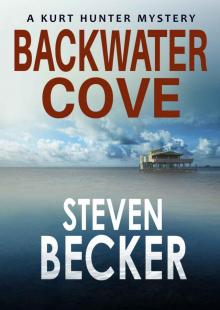 Backwater Cove
Backwater Cove Storm Surge: A Fast Paced International Adventure Thriller (Storm Thriller Series Book 3)
Storm Surge: A Fast Paced International Adventure Thriller (Storm Thriller Series Book 3)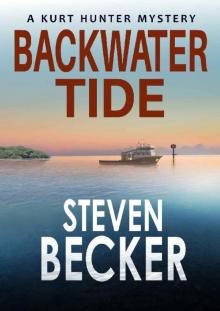 Backwater Tide
Backwater Tide Backwater Pass
Backwater Pass Backwater Flats
Backwater Flats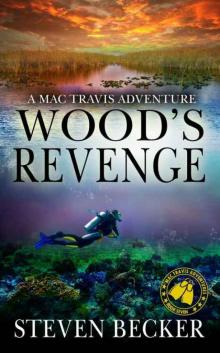 Wood's Revenge
Wood's Revenge Haitian Gold
Haitian Gold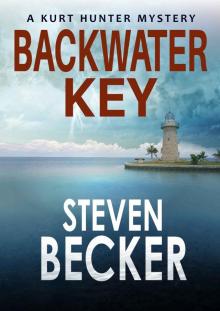 Backwater Key
Backwater Key Wood's Tempest
Wood's Tempest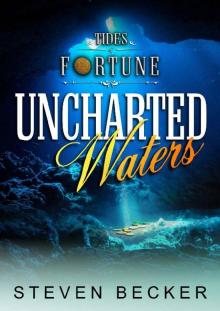 Uncharted Waters
Uncharted Waters Tuna Tango
Tuna Tango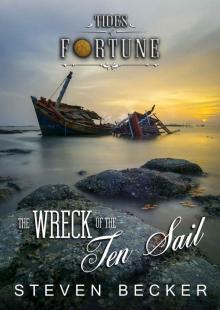 The Wreck of the Ten Sail
The Wreck of the Ten Sail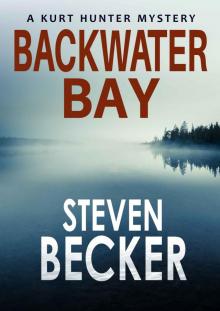 Backwater Bay (Kurt Hunter Mysteries Book 1)
Backwater Bay (Kurt Hunter Mysteries Book 1) Storm Clouds
Storm Clouds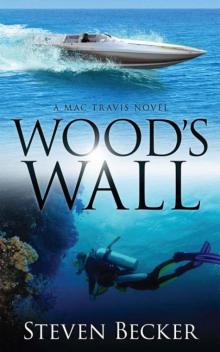 Wood's Wall
Wood's Wall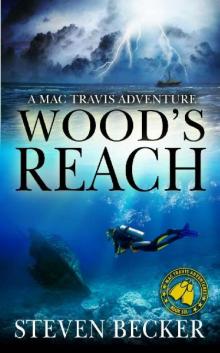 Wood's Reach
Wood's Reach Wood's Fury
Wood's Fury Storm Rising
Storm Rising Bonefish Blues
Bonefish Blues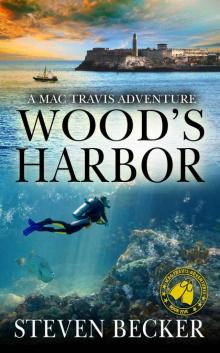 Wood's Harbor: Action & Sea Adventure in the Florida Keys (Mac Travis Adventures Book 5)
Wood's Harbor: Action & Sea Adventure in the Florida Keys (Mac Travis Adventures Book 5)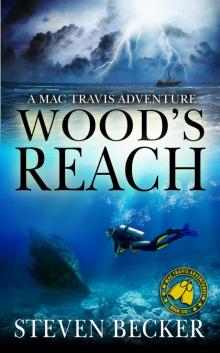 Wood's Reach: Action & Sea Adventure in the Florida Keys (Mac Travis Adventures Book 6)
Wood's Reach: Action & Sea Adventure in the Florida Keys (Mac Travis Adventures Book 6)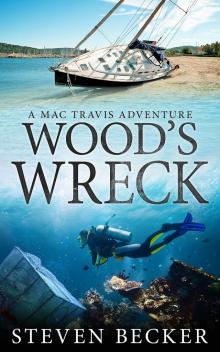 Wood's Wreck
Wood's Wreck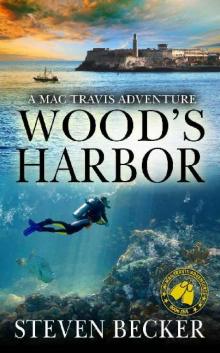 Wood's Harbor
Wood's Harbor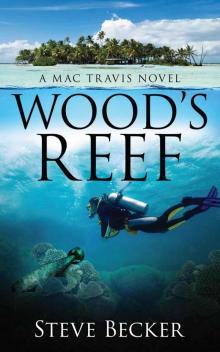 Wood's Reef
Wood's Reef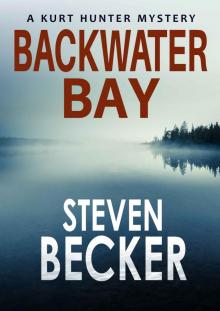 Backwater Bay
Backwater Bay